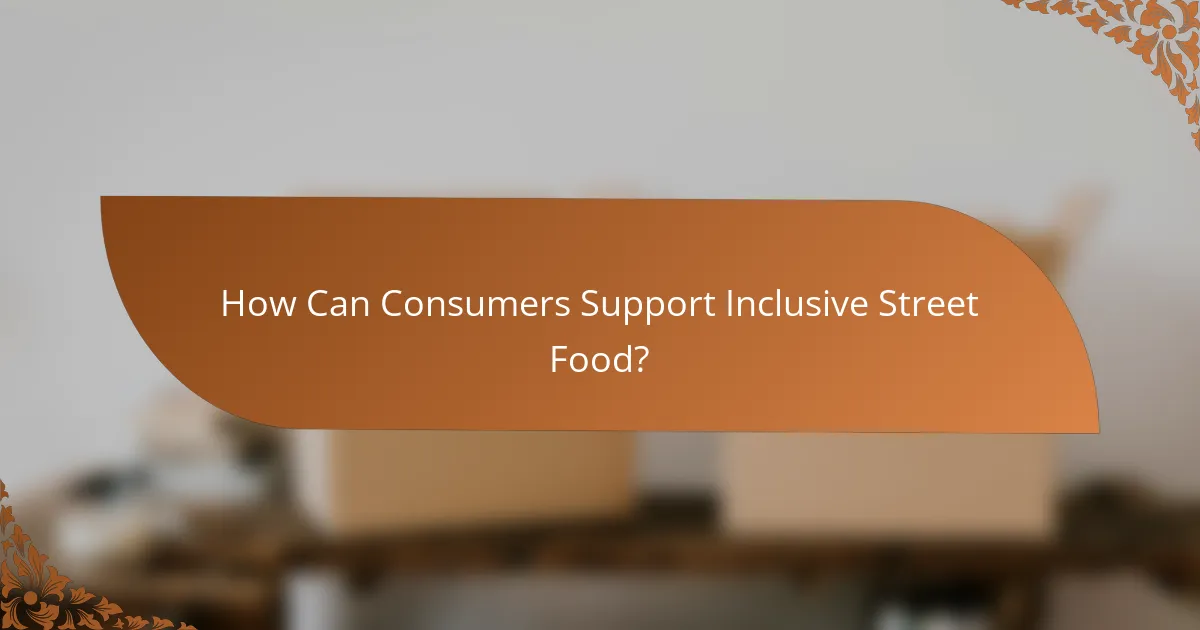Inclusive street food practices are essential for fostering a thriving culinary landscape that benefits diverse communities. By advocating for supportive policies and providing necessary resources, we can empower all vendors to succeed, enhancing economic growth and culinary diversity. Embracing inclusivity not only strengthens community connections but also creates a vibrant marketplace that reflects the richness of our society.

How Can Street Food Practices Be Made More Inclusive?
Inclusive street food practices can be achieved by actively involving diverse communities, providing necessary resources, and advocating for supportive policies. These efforts ensure that all vendors, regardless of background, can thrive in the street food landscape.
Community engagement initiatives
Community engagement initiatives are essential for fostering inclusivity in street food practices. These programs can include local festivals that celebrate diverse cuisines, allowing vendors from various backgrounds to showcase their offerings. Engaging the community helps build a supportive network that values cultural diversity.
Additionally, organizing regular meetings or forums can encourage dialogue between vendors and community members. This interaction can lead to better understanding of the challenges faced by different vendors and promote collaborative solutions.
Access to resources for vendors
Access to resources is critical for enabling street food vendors to operate successfully. This includes providing information on permits, health regulations, and best practices for food safety. Local governments can create resource hubs or online platforms where vendors can easily find the information they need.
Financial support, such as microloans or grants, can also help vendors invest in their businesses. Programs that offer low-interest loans specifically for minority-owned food businesses can significantly enhance their ability to thrive.
Training programs for diverse cuisines
Training programs tailored to diverse cuisines can empower vendors by enhancing their culinary skills and business acumen. Workshops that focus on food preparation, hygiene standards, and customer service can help vendors meet local health regulations while improving their offerings.
Collaboration with culinary schools or local chefs can provide valuable mentorship opportunities. These partnerships can facilitate knowledge transfer and inspire vendors to innovate while respecting their cultural roots.
Partnerships with local organizations
Forming partnerships with local organizations can amplify efforts to create inclusive street food practices. Nonprofits focused on economic development or cultural preservation can provide support in areas such as marketing, training, and networking opportunities for vendors.
These partnerships can also help in organizing events that highlight the contributions of diverse food vendors, thereby increasing their visibility and customer base. Engaging local businesses can further enhance these initiatives by creating a supportive ecosystem.
Policy advocacy for inclusivity
Advocating for inclusive policies is crucial for ensuring that street food practices are equitable. This can involve lobbying for regulations that support small vendors, such as reducing permit fees or simplifying the application process for food licenses.
Working with local government officials to create policies that prioritize inclusivity can lead to long-term benefits for the street food community. Engaging in public discussions and providing data on the economic impact of diverse vendors can strengthen advocacy efforts.

What Are the Benefits of Inclusive Street Food Practices?
Inclusive street food practices offer significant advantages, including economic growth for marginalized communities, enhanced culinary diversity for consumers, and stronger community connections. By embracing inclusivity, street food vendors can create a vibrant marketplace that benefits everyone involved.
Economic empowerment for marginalized groups
Inclusive street food practices can provide economic opportunities for marginalized groups, such as immigrants and low-income individuals. By lowering entry barriers, such as startup costs and regulatory hurdles, these practices enable diverse entrepreneurs to enter the market and thrive.
For example, food carts or pop-up stalls often require less investment than traditional restaurants, allowing individuals with limited resources to start their businesses. This economic empowerment can lead to increased income, job creation, and improved living standards for these communities.
Diverse culinary experiences for consumers
Consumers benefit from inclusive street food practices through access to a wide range of culinary experiences. Street food vendors often bring unique flavors and traditional recipes from various cultures, enriching the local food scene.
This diversity allows consumers to explore different cuisines at affordable prices, making it easier to try new dishes. Additionally, food festivals and markets that promote inclusivity can attract larger crowds, further enhancing the culinary landscape.
Strengthening community ties
Inclusive street food practices can strengthen community ties by fostering interaction and collaboration among diverse groups. When vendors from different backgrounds come together, they create a shared space that encourages cultural exchange and mutual support.
Community events centered around street food can also bring residents together, promoting social cohesion and a sense of belonging. These gatherings can help break down barriers and build relationships, ultimately contributing to a more inclusive and vibrant community.

What Challenges Do Street Food Vendors Face?
Street food vendors encounter various challenges that can hinder their operations and success. These issues often stem from regulatory barriers, lack of funding and support, and health and safety compliance requirements.
Regulatory barriers
Street food vendors frequently face complex regulations that vary by location, making it difficult to navigate the legal landscape. These regulations can include permits, zoning laws, and health codes that differ significantly from one city or country to another.
For example, in some urban areas, vendors may need multiple licenses to operate legally, which can be time-consuming and costly. Understanding local regulations is crucial for vendors to avoid fines or shutdowns.
Lack of funding and support
Many street food vendors struggle to secure funding to start or grow their businesses. Traditional financing options may be inaccessible due to a lack of credit history or collateral, leaving vendors with limited resources.
Support from local governments or organizations can be scarce, which exacerbates the challenges. Initiatives that offer microloans or grants specifically for street food vendors can help bridge this gap and foster business growth.
Health and safety compliance issues
Health and safety compliance is a significant concern for street food vendors, as they must adhere to strict hygiene standards to protect customers. Failure to comply can result in health violations, fines, or even closure.
Vendors should stay informed about local health regulations and invest in proper training for food handling and safety. Regular inspections and maintaining cleanliness can help ensure compliance and build customer trust.

How Can Consumers Support Inclusive Street Food?
Consumers can support inclusive street food by actively choosing diverse vendors, participating in local food events, and advocating for policy changes that promote accessibility and equity within the food industry.
Choosing diverse vendors
Selecting diverse street food vendors is a direct way to support inclusivity. Look for vendors from various cultural backgrounds, including those who may be underrepresented in the food scene. This not only enriches your culinary experience but also helps sustain diverse communities.
When choosing vendors, consider those who offer unique dishes that reflect their heritage. Supporting women-owned, minority-owned, or immigrant-owned businesses can make a significant impact on local economies and promote diversity in the food landscape.
Participating in local food events
Engaging in local food events is an excellent way to support inclusive street food. These events often showcase a variety of vendors, providing a platform for diverse culinary traditions. Attend food festivals, farmers’ markets, or community gatherings that highlight inclusivity.
When participating, encourage event organizers to include a wide range of vendors. You can also share your experiences on social media to raise awareness and attract more attendees, helping to create a vibrant and diverse food community.
Advocating for policy changes
Advocating for policy changes is crucial for fostering an inclusive street food environment. Support initiatives that promote fair regulations for street vendors, such as simplified licensing processes and access to public spaces. These changes can help remove barriers for diverse vendors.
Engage with local government and community organizations to voice your support for policies that benefit street food vendors. Attend town hall meetings or write to your representatives to emphasize the importance of inclusivity in the food industry.

What Role Do Local Governments Play in Advocacy?
Local governments play a crucial role in advocating for inclusive street food practices by establishing frameworks that support vendors and promote accessibility. Through regulations and funding, they can create an environment where diverse food offerings thrive while ensuring safety and equity for all community members.
Creating supportive regulations
Supportive regulations are essential for fostering an inclusive street food environment. Local governments can implement policies that simplify the permitting process for food vendors, ensuring that diverse culinary options are available without excessive bureaucratic hurdles. For instance, streamlining health and safety inspections can encourage more vendors to enter the market.
Additionally, regulations can address accessibility by mandating that food stalls accommodate individuals with disabilities. This could include requirements for wheelchair access or the provision of menus in multiple languages, ensuring that all community members can enjoy the offerings.
Providing funding for initiatives
Funding initiatives are vital for supporting street food vendors, particularly those from marginalized communities. Local governments can allocate grants or low-interest loans to help vendors cover startup costs, such as equipment or permits. This financial support can significantly lower barriers to entry for aspiring food entrepreneurs.
Moreover, governments can invest in community programs that promote street food markets, enhancing visibility and foot traffic. For example, organizing food festivals or regular street markets can provide vendors with a platform to showcase their offerings, ultimately benefiting both the vendors and the local economy.
